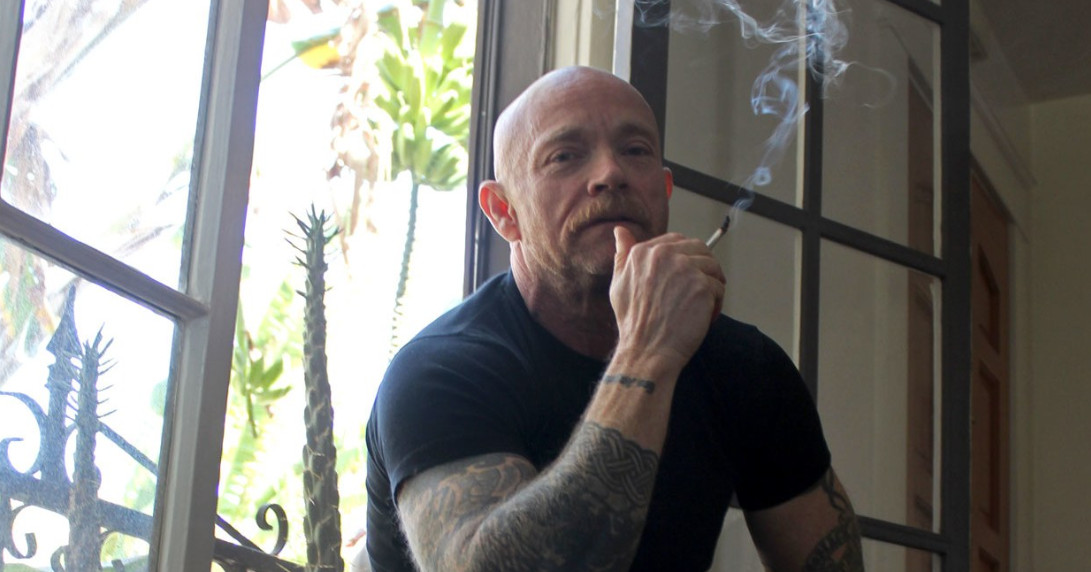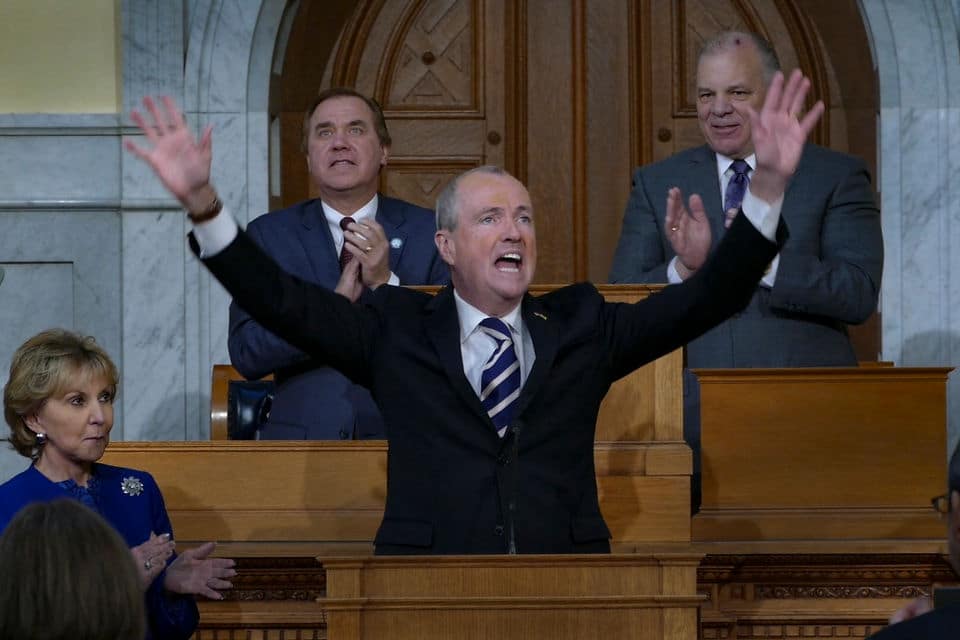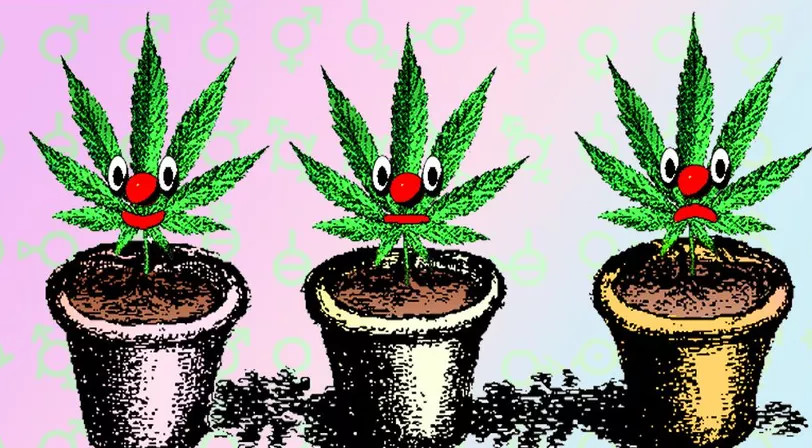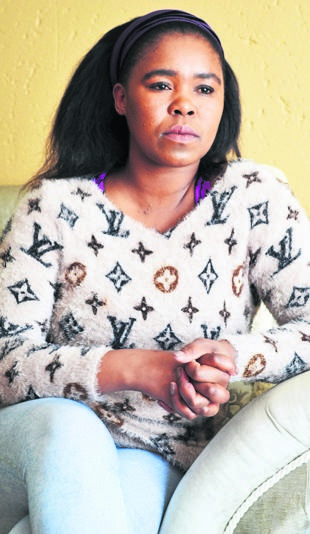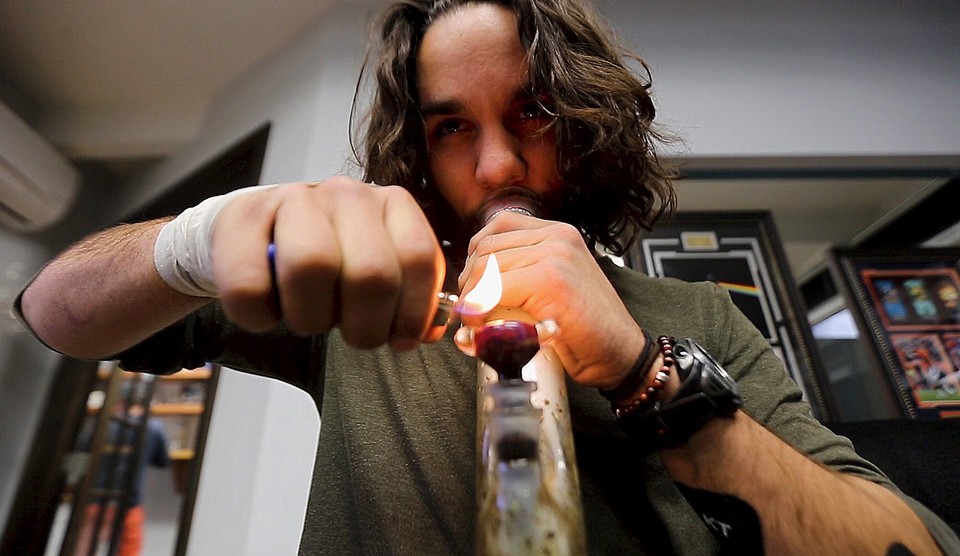A week after marijuana became legal in California, Buck Angel slid into a banquette at the back of a dark Hollywood bar and took a long hit of his vape pen. The iconic activist and self-proclaimed “tranpa” of the adult movie world was coming off of two full days working a sex-toy expo, where he had introduced his second trans-specific toy and was preparing to leave in a few days for a worldwide speaking tour. He claimed to be exhausted, but you would never have known. Even in a black suit vest and thick black-rimmed glasses, Angel had the look of a leather-daddy biker dude, all muscles and mustache and tattoos, and the energy of a kid on sugar.
That night alone he was managing several pursuits at once. His cannabis company, Pride Wellness, was sponsoring the jazzy “Marijuana Madness” burlesque show that was about to begin, which meant that bartenders were serving cocktails and non-alcoholic mocktails infused with one of his products, made from the trendy, won’t-get-you-high cannabinoid CBD. After a decade of being one of the most well-known trans men in the world, breaking barriers and educating queer and straight folks alike, Angel had set his sights on the $40 billion marijuana industry, and using his role as an influencer to bring the healing powers of weed back to the LGBTQ+ community, where the legalization movement began.
“The queer community, specifically gay men and the HIV/AIDS crisis, are why we even have legal cannabis today,” Angel says, taking a sip of his mocktail. He was referring to the AIDS activists in the late 80s and early 90s who were crucial in pushing California to legalize medical marijuana. “Now, it’s going to become all white male corporate out there, and the queer community that’s been in on it forever and started this whole thing will be left out.”
Angel’s persistence and confidence propelled him to success in the adult industry, and now he was ready to do the same for weed — which is how he ended up at a 1930’s-themed burlesque show celebrating the end of pot prohibition. In the back room, friendly budtenders offered cannabis-infused vegan fruit-and-nut clusters and hits from high-end glass vaporizers. On the walls were projections of old propaganda movie posters that warned “Marihuana: Weed With Roots In Hell — Weird Orgies, Wild Parties, Unleashed Passions!” Angel knew he had to get up and address the crowd, at some point, but in between firing off emails on his phone, he was also doing one of his very favorite things: trying to figure out how he could help some new friends with their business, because he thought they had something great to offer the trans community.
He had met Rachel Washtein and Cyo Nystrom a few months earlier, at San Francisco’s Folsom Street Fair, and was immediately impressed with their product: a weed-infused “intimate oil” called Quim Rock that bills itself as “a self-care line for humans with vaginas and humans without vaginas who love vaginas.” Much of Angel’s fame has come from how open he’s been to discussing and displaying his vagina — a revolutionary act in the early days of mainstream trans acceptance that both normalized trans men who weren’t interested in bottom surgery and satisfied cis folks who didn’t understand why asking trans people details about their genitalia was rude.
Having worked on his own line of non-cannabis lubricant before, and having tried a few other marijuana lubes, Angel has rather high standards. “My vagina is my business, and people don’t talk about vaginal health,” he said. “Trans men, if you’re using testosterone, it’s basically like going through menopause. Your vagina becomes dry and irritable and you don’t want to have sex.” But when the women behind Quim Rock gave him some samples, he had a good feeling. “I knew they were for real when I looked at their ingredients,” he went on. “And then I went home and tried it and I said, ‘This is awesome.’
Now the three pot entrepreneurs were passing Angel’s vape pen back and forth, brainstorming future collaborations, sharing contacts, and chatting about the party that was going on around them.
“This is like, very straight,” Angel said, gesturing at the red velvet curtains and the La La Landvibes of the band setting up on stage — four white men in suits, one in a fedora. “That’s not a bad thing, but I don’t really hang at places like this.”

Credit: them.us
The music began, and a woman with a red flower behind her ear came out to shimmy and sashay around the stage, taking off one layer at a time: first a long lace gown, then a bedazzled black corset, and finally a rhinestone-encrusted black bra, leaving only some satin panties and a pair of star-shaped pasties. The mustachioed drummer made googly eyes at her, while the sax player, in a three-piece tweed suit with a pocket square, looked lost in his own jam.
“Let’s be real though,” Nystrom stage-whispered. “The saxophone player? He fucks.”
The audience, decked out in furs and leopard print, was in a triumphant mood. Many could hardly believe that this was happening: that weed was finally legal, and they didn’t have to hide the fact that they were stoned.
Angel and his friends felt a little disoriented by all the revelry. “It’s funny to be at a celebration of cannabis legalization when it feels like such a weight on our shoulders right now,” Washtein said. “This is the first break I’ve taken in, like, weeks.”
Angel agreed. The realities of running a legal marijuana business were overwhelming. Licensing, taxes, zoning, regulations: all of this took time, persistence, money, and connections. And as in most industries, any entrepreneur who isn’t a cis white man is at a disadvantage. Most of the investors that Nystrom and Washtein had been meeting with didn’t really understand that their product had the potential to appeal to half of the world’s population.
“When you’re talking to someone without a vagina, they’re like, ‘This sounds so niche!’” Nystrom said. “One guy just started using the word ‘pussy,’ out of nowhere. It made the hair on the back of my neck stand up.”
Nystrom wants Quim Rock to be “like a night cream” — something you use proactively to promote vaginal health, and not just to enhance sexual pleasure. She herself had dealt with over a decade of yeast infections and urinary tract infections — “an ouroboros of itchiness” — before discovering the heady combination of organic cannabis oil, coconut oil, and tea tree oil. After a few years as head of sales at marijuana software start-up (and Silicon Valley darling) Meadow, Nystrom joined forces with Washtein to launch Quim Rock in the spring of last year. “Quim” is 17th-century British slang for “vagina,” and she and Washtein maintain a shared document of over a hundred yonic euphemisms. (“Vertical smile,” “yawning chasm,” “danger clam,” etc). Already, the two women felt confident that the product could catch on: a young woman struggling with a medical condition called vaginismus had recently sent them a grateful, encouraging e-mail, saying that Quim Rock had changed her life: “The ONLY completely positive experience that my quim and I have had is thanks to a sample of your intimate oil that I got at Ganja Yoga.”
And then Washtein and Nystrom had met Angel and discovered that Quim Rock filled a need that hadn’t even occurred to them: vaginal care for trans men dealing with the discomforts caused by hormone therapy. Now they had been swept up in Angel’s grand vision of a grassroots movement to improve the lives and health of LGBTQ+ people everywhere using cannabis.
Just before intermission, Angel bounded on stage, directing his warmth and mission to the crowd at large. “We are at a really amazing time,” he said. “Remember when you were 13 and had to hide it? You don’t have to do that anymore! There’s a lot of opportunities here, but we can’t just let one type of person take this business. I’m a transsexual man, and my partner is too. We’re creating jobs for people the white man hates… and I can say that because I used to be a white lady!”
This was not just empty talk. Angel and his business partner, photographer Leon Mostovoy, had only hired queer, female, or non-white drivers for their pot delivery service. The company donates a dollar for every product sold to help homeless seniors through the elderly services department at the Los Angeles LGBT Center. (“They were willing to go on a limb with us and take our drug money,” Angel joked.) And he is committed to spreading the message about how cannabis can help with LGBTQ-specific health problems.
“I think I will save lives by talking about cannabis and cannabis as an alternative to pharmaceutical drugs,” Angel said, once he was sitting back down. “In our queer community, there’s a lot of addiction and drug use, especially with meth. There’s a lot of mental health issues, and we get prescribed a lot of bullshit pharmaceuticals.”
In dealing with discrimination and harassment, LGBTQ+ folks experience significantly higher rates of substance abuse and homelessness compared to the cis and straight populations. Angel himself struggled with addiction between the ages of 17 and 28, when he was still trying to come to terms with who he was, and spent time living on the streets of West Hollywood. After he got sober, he realized that he wanted to transition, and began what was then a very lonely journey as the guinea pig of Beverly Hills doctors who had never helped a trans man with hormones or gender confirmation surgery before.
He had quit weed, too, when he gave up coke and crack and alcohol, but he already had some inkling that marijuana was not quite the same as other illegal drugs. Back in the 1980s, when many of his friends abruptly got AIDS and began “dropping like flies,” Angel saw that cannabis was a powerful medicine.
“Every guy with HIV and AIDS smoked weed,” Angel said. Between the weight loss brought on by AIDS-related diseases and the nausea and loss of appetite caused by the early HIV medication AZT, everyone was emaciated. For a lot of people, the munchies were a godsend. “My friends were too sick to buy it for themselves, so I would go to downtown LA with a piece of newspaper, and you could see the dudes on the corners, and you would whistle and say, ‘A nickel!’ And they would run behind the building and come back and shove a $5 bag in the piece of newspaper.”

Credit: them.us
It’s easy to forget, as tech bros hype disruptive vape pens and celebrity wellness platforms coo over “refined ceramic bongs,” that this is how the modern era of marijuana legalization began: as a movement for queer health. While the federal government and pharmaceutical companies wallowed in homophobia, largely ignoring the hundreds of thousands of people dying from this terrifying new disease, gay men and their allies took matters into their own hands: flying around the world to acquire promising therapies, creating underground buyer’s clubs to share illicit treatments, and ultimately convincing voters first in San Francisco, in 1992, and then across all of California, in 1996, to legalize the medical use of pot.
Today, a lot has changed, but too much has not. Queer rights and cannabis legalization progressed as parallel socio-political movements, gaining national acceptance that would have been unthinkable just decades earlier. But mainstream medicine lags woefully behind public opinion. Doctors across the country remain unprepared and often unwilling to discuss medicinal cannabis, or to treat people outside the gender binary. The federal government encourages this backwards behavior, with the Trump administration rolling back many of the limited protections that did exist for queer folks and for state-legal marijuana. In recent weeks, the Justice Department rescinded a series of memos that provided guidelines for how places with legal weed could avoid federal raids and prosecution, and the Department of Health and Human Services created a division designed to protect doctors and nurses that refuse to help LGBTQ+ people on religious grounds.
So even as cannabis and queerness have become more mainstream than ever before, with private equity money backing industrial pot grows and trans stars gracing the covers of elite magazines, both movements are still forced to circumvent the often illogical and discriminatory medical establishment. In 2018, just as in 1988, the best medical advice involving marijuana, queer health care, or both, passes from friend to friend, through community centers and group chats and informal networks that typically lack the luxury of formal research and expertise.
Angel hopes to harness the power of those channels and continue the legacy of queer cannabis, both with his own company and by promoting others, like Quim Rock. He started using pot again about five years ago, during a particularly difficult bout with insomnia. A doctor had prescribed Ambien, but soon he was sleepwalking and waking up with potato chips and cheese in his bed. A friend suggested he try cannabis instead, and when it worked, he realized that pharmaceuticals often made things worse, not better.
“We could go on forever about the medical industry — what a fucking joke,” he says. And even though he now uses some form of marijuana nearly every day, he still considers himself sober, asking, “Why is it ok for someone in sobriety to use Vicodin but not cannabis?”
Still, he knows succeeding in the cannabis industry would not necessarily be easy. He and Mostovoy, his business partner, recently attended a meeting about marijuana business licensing in the LGBTQ+ mecca of West Hollywood, and were dismayed at what they saw.
“Everyone that was there was straight and white and money, and I was so mad,” Angel says. “I’m offended by that. What if I went to Compton right now and opened a shop? That’s not okay. That’s not my neighborhood. That’s not my people. That’s taking a job from a person of color.”
But Angel refuses to be deterred, and has avoided taking on investors. “As a trans man, it’s everything that I have my own business, and my own space, and don’t have to rely on anyone,” he says. “Leon and I have been in the community for over 30 years. We’re just two little tranny dudes with our piggy banks. But we saw how much money is involved in this. And now, it’s all about taking this opportunity, and sharing it with a huge community of our people.”
Credit: them.us

